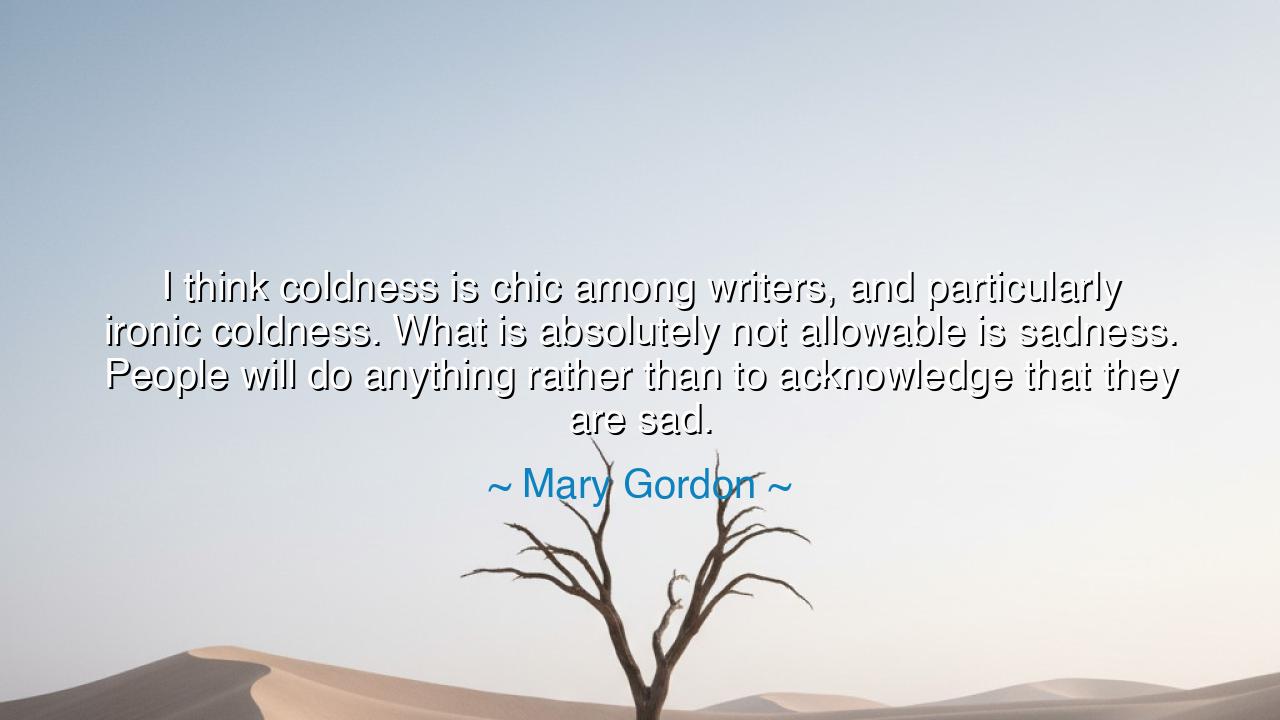
I think coldness is chic among writers, and particularly ironic
I think coldness is chic among writers, and particularly ironic coldness. What is absolutely not allowable is sadness. People will do anything rather than to acknowledge that they are sad.






Hear the piercing words of Mary Gordon: “I think coldness is chic among writers, and particularly ironic coldness. What is absolutely not allowable is sadness. People will do anything rather than to acknowledge that they are sad.” In this saying, she reveals a deep wound of our age—the fear of vulnerability, the fear of appearing weak. To be cold is acceptable, even fashionable; to be ironic is celebrated; but to be openly sad, to confess sorrow without disguise, is treated as shameful. Her lament is not only about literature, but about the human condition in a world that worships detachment.
The writer, who once was seen as the prophet of the soul, now often hides behind irony, wit, and distance. To be clever is safe; to be sad is dangerous. Yet sadness is the most universal of human experiences. It binds us to one another, for none escape its touch. Gordon declares that to deny sadness is to deny truth itself. The chic mask of coldness may impress, but it cannot heal. Only the honest confession of grief has the power to comfort, to connect, to remind us that we are not alone.
The ancients knew this well. In the tragedies of Athens, the people did not come to hear cold irony—they came to weep. They gathered in thousands to watch Oedipus blinded by fate, Antigone buried alive, Hecuba mourning her children. These tales did not weaken them; they made them strong, for in shared sadness they found solidarity. They called this catharsis, the cleansing of the heart through grief. What Gordon mourns is the loss of this ancient wisdom: that tears are not shameful, but sacred.
History offers further witness. Abraham Lincoln, though a man of power, carried within him a melancholy so deep that his contemporaries often worried for his life. Yet he did not hide this sorrow behind irony or coldness. Instead, he gave it voice in words that still echo: “The mystic chords of memory… will yet swell the chorus of the Union.” His greatness did not come from denying his sadness, but from embracing it, transforming it into compassion for a fractured nation.
Why then do people flee sorrow today? Because sadness demands honesty, and honesty demands courage. It is easier to wear the cloak of coldness, to dismiss feelings with a smirk or a clever line, than to admit, “I am hurting.” The world fears tears because they strip away pretense. Yet without them, the soul grows brittle. Irony may protect, but it does not nourish; only vulnerability allows true connection.
The lesson is clear: do not be deceived by the fashion of detachment. Do not fear your sadness, for it is not a weakness but a gateway to depth. If you are a writer, dare to write not only with wit but with tears. If you are a friend, dare to listen to another’s sorrow without flinching. If you are alone, dare to admit your grief rather than bury it beneath irony. In sadness acknowledged lies the seed of healing, while in sadness denied lies isolation.
So let Gordon’s words be a warning and a summons: cast aside the mask of coldness and dare to be human. In a world that celebrates irony and despises tears, let us reclaim the sacred truth that sadness is part of life’s fabric. To embrace it is to live honestly, to speak with authenticity, and to touch the hearts of others. For in the end, it is not irony that binds us together, but the quiet courage to admit that we weep, and that through our tears, we are made whole.






AAdministratorAdministrator
Welcome, honored guests. Please leave a comment, we will respond soon